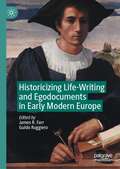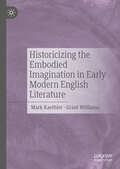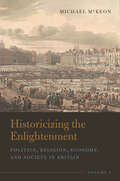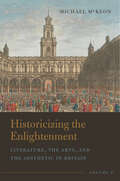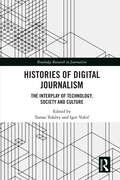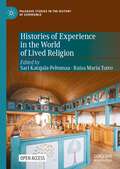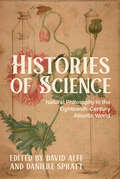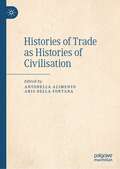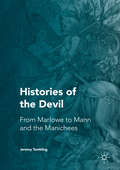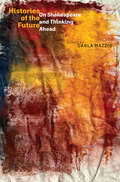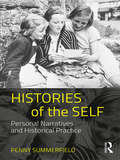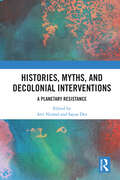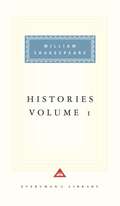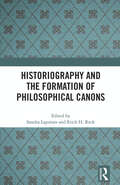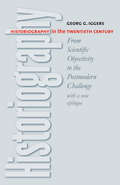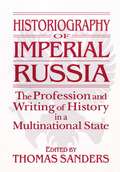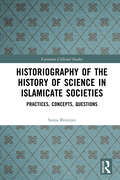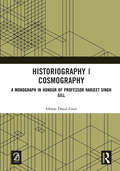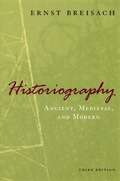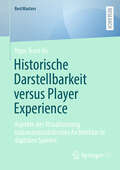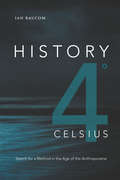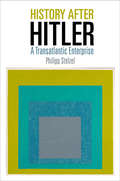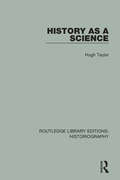- Table View
- List View
Historicizing Colonial Nostalgia
by Patricia M.E. LorcinThis illuminating study of European women's narratives in colonial Algeria and Kenya argues that nostalgia was not a post-colonial phenomenon but was embedded in the colonial period. Patricia M. E. Lorcin explores the distinction between imperial nostalgia, associated with the loss of power that results from the loss of empire, and colonial nostalgia, associated with loss of socio-cultural standing—in other words, loss of a certain way of life. This distinction helps to make women's discursive role an important factor in the creation of colonial nostalgia, due to their significant contribution to the establishment of a European colonial environment.
Historicizing Life-Writing and Egodocuments in Early Modern Europe
by James R. Farr Guido RuggieroThis volume historicizes the study of life-writing and egodocuments, focusing on early modern European reflections on the self, self-fashioning, and identity. Life-writing and the study of egodocuments currently tend to be viewed as separate fields, yet the individual as a purposive social actor provides significant common ground and offers a vehicle, both theoretical and practical, for a profitable synthesis of the two in a historical context. Echoing scholars from a wide-range of disciplines who recognize the uncertainty of the nature of the self, these essays question the notion of the autonomous self and the attendant idea of continuous identity unfolding in a unified personality. Instead, they suggest that the early modern self was variable and unstable, and can only be grasped by exploring selves situated in specific historical and social/cultural contexts and revealed through the wide range of historical documents considered here. The three sections of the volume consider: first, the theoretical contexts of understanding egodocuments in early modern Europe; then, the practical ways egodocuments from the period may be used for writing life-histories today; and finally, a wider range of historical documents that might be added to what are usually seen as egodocuments.
Historicizing the Embodied Imagination in Early Modern English Literature
by Grant Williams Mark KaethlerCommonly used as a rallying cry for general approaches to literary studies, the imagination has until recently been overwritten with romantic and modernist inflections that impede our understanding of literature’s intimate involvement in early modern cognition. To recover the pre-Cartesian imagination, this collection of essays takes a historicist approach by situating literary texts within the embodied and ensouled faculty system. Image-making and fantasizing were not autonomous activities but belonged to a greater cognitive ecosystem, which the volume’s four sections reflect: “The Visual Imagination,” “Sensory and Affective Imaginings,” “Artifice and the Mnemonic Imagination,” and “Higher Imaginings.” Together they accentuate the imagination’s interdependency and friction with other faculties. Ultimately, the volume’s attention to the embodied imagination gives scholars new perspectives on literary and image production in the writings of Spenser, Shakespeare, Donne, and their contemporaries.
Historicizing the Enlightenment, Volume 1: Politics, Religion, Economy, and Society in Britain
by Michael McKeonThe Enlightenment has been blamed for some of the most deadly developments of modern life: racism and white supremacy, imperialist oppression, capitalist exploitation, neoliberal economics, scientific positivism, totalitarian rule. These developments are thought to have grown from principles that are rooted in the soil of the Enlightenment: abstraction, reduction, objectification, quantification, division, universalization. Michael McKeon’s new book corrects this defective view by historicizing the Enlightenment--by showing that the Enlightenment has been abstracted from its history. From its past: critics have ignored that Enlightenment thought is a reaction against deadly traditions that precede it. From its present: the Enlightenment extended its reactive analysis of the past to its own present through self-analysis and self-criticism. From its future: much of what’s been blamed amounts to the failure of its posterity to sustain Enlightenment principles. To historicize the Enlightenment requires that we conjure what it was like to live through the emergence of concepts and practices that are now commonplace—society, privacy, the public, the market, experiment, secularity, representative democracy, human rights, social class, sex and gender, fiction, the aesthetic attitude. McKeon’s book argues the continuity of Enlightenment thought, its consistency and integrity across this broad range of conceptual domains. It also shows how the Enlightenment has shaped our views of both tradition and modernity, and the revisionary work that needs to be done in order to understand our place in the future. In the process, Historicizing the Enlightenment exemplifies a distinctive historiography and historical method. Published by Bucknell University Press. Distributed worldwide by Rutgers University Press.
Historicizing the Enlightenment, Volume 2: Literature, the Arts, and the Aesthetic in Britain
by Michael McKeonEnlightenment critics from Dryden through Johnson and Wordsworth conceived the modern view that art and especially literature entails a double reflection: a reflection of the world, and a reflection on the process by which that reflection is accomplished. Instead “neoclassicism” and “Augustanism” have been falsely construed as involving a one-dimensional imitation of classical texts and an unselfconscious representation of the world. In fact these Enlightenment movements adopted an oblique perspective that registers the distance between past tradition and its present reenactment, between representation and presence. Two modern movements, Romanticism and modernism, have appropriated as their own these innovations, which derive from Enlightenment thought. Both of these movements ground their error in a misreading of “imitation” as understood by Aristotle and his Enlightenment proponents. Rightly understood, neoclassical imitation, constitutively aware of the difference between what it knows and how it knows it, is an experimental inquiry that generates a range of prefixes—“counter-,” “mock-,” “anti-,” “neo-”—that mark formal degrees of its epistemological detachment. Romantic ideology has denied the role of the imagination in Enlightenment imitation, imposing on the eighteenth century a dichotomous periodization: duplication versus imagination, the mirror versus the lamp. Structuralist ideology has dichotomized narration and description, form and content, structure and history. Poststructuralist ideology has propounded for the novel a contradictory “novel tradition”—realism, modernism, postmodernism, postcolonialism—whose stages both constitute a sequence and collapse it, each stage claiming the innovation of the stage that precedes it. Published by Bucknell University Press. Distributed worldwide by Rutgers University Press.
Histories of Digital Journalism: The Interplay of Technology, Society and Culture (Routledge Research in Journalism)
by Tamas Tofalvy Igor VobičBuilding on the momentum of the recent “historical turn” in digital media and Internet studies, this volume explores how digital journalism has developed from a historical perspective. With contributions from established and emerging scholars from Europe, Asia, South and North America, the book investigates not only how established journalistic systems transformed in the early days of digital but how the structural, technological, and cultural changes induced by digitization have reconfigured the trajectory of journalism.The book argues in support of three main claims. The first is that emphasis should be given to the plurality of histories instead of one single digital journalism history, thereby acknowledging the complexities, interactions of social relations, cultural traditions, power configurations, and technological changes that have shaped journalism and digitization. The second is the decentralization and decolonization of digital journalism histories. The third refers to the need to highlight and demonstrate the idea that the evolution of digital journalism should be viewed as the co-construction of the social and technological realms.With theoretical and methodological reflections on historicizing digital journalism along with original case studies or comparative inquiries into the phenomena over the decades-long digital revolution of journalism, this volume will shape the nascent field of digital journalism history and start a global critical exchange of various approaches to and aspects of historicizing digital journalism. As such, it will interest scholars and students of digital journalism, journalism history, digital media, Internet studies, and technology studies.
Histories of Experience in the World of Lived Religion (Palgrave Studies in the History of Experience)
by Raisa Maria Toivo Sari Katajala-Peltomaa'At a historic moment, when religion shows all its social and political strength in various post-modern societies around our globe, this fascinating collection of studies from the Middle Ages to twentieth-century Europe demonstrates all the richness and innovative force of investigating individual and shared experiences when questioning the cultural, political and social place of religion in society. It also makes known in English the work of a series of Finnish historians elaborating together a pioneering vision of the notion of experience in the discipline of history.'- Piroska Nagy, Université du Québec à Montréal, Canada This open access book offers a theoretical introduction to the history of experience on three conceptual levels: everyday experience, experience as process, and experience as structure. Chapters apply 'experience' to empirical case studies, exploring how people have made and shared their religion through experience in history. This book understands experience as a simultaneously socially constructed and intimately personal process that connects individuals to communities and past to future, thereby forming structures that create and direct societies. It represents the crossroads of a new field of the history of experience, and an established tradition of the history of lived religion. Chapters offer a longue durée view from the fourteenth-century heretics, via experiences of miracle, madness, sickness, suffering, prayer, conversion and death, to the religious artisanship of soldiers in the Second World War frontlines. It concentrates on Northern Europe, but includes materials from Italy, France and United Kingdom.
Histories of Science: Natural Philosophy in the Eighteenth-Century Atlantic World
by David Alff Danielle SprattSpreading the news of scientific breakthroughs in the eighteenth centuryHistories of Science shows how different forms of media communicated scientific breakthroughs during the long eighteenth century, bringing together eighteen humanities scholars to discuss the representation, reception, and application of natural philosophy in the Atlantic world. In particular, the authors focus on descriptions of scientific discoveries in popular print, with essays on topics as varied as placebo pills, irrigation systems, and navigational technology. And while each contributor advances a discrete argument, the collection coheres in its shared questions of methodology, historicity, and ethics. Histories of Science expands our record of the past, our understanding of the present, and our ability to imagine the future.
Histories of Trade as Histories of Civilisation
by Antonella Alimento Aris Della FontanaThis edited collection explores the histories of trade, a peculiar literary genre that emerged in the context of the historiographical and cultural changes promoted by the histoire philosophique movement. It marked a discontinuity with erudition and antiquarianism, and interacted critically with universal history. By comparing and linking the histories of individual peoples within a common historical process, this genre enriched the reflection on civilisation that emerged during the long eighteenth century. Those who looked to the past wanted to understand the political constitutions and manners most appropriate to commerce, and grasp the recurring mechanisms underlying economic development. In this sense, histories of trade constituted a declination of eighteenth-century political economy, and thus became an invaluable analytical and practical tool for a galaxy of academic scholars, journalists, lawyers, administrators, diplomats and government ministers whose ambition was to reform the political, social and economic structure of their nations. Moreover, thanks to these investigations, a lucid awareness of historical temporality and, more particularly, the irrepressible precariousness of economic hegemonies, developed. However, as a field of tension in which multiple and even divergent intellectual sensibilities met, this literary genre also found space for critical assessments that focused on the ambivalence and dangers of commercial civilisation. Examining the complex relationship between the production of wealth and civilisation, this book provides unique insights for scholars of political economy, intellectual history and economic history.
Histories of the Devil
by Jeremy TamblingThis book is about representations of the devil in English and European literature. Tracing the fascination in literature, philosophy, and theology with the irreducible presence of what may be called evil, or comedy, or the carnivalesque, this book surveys the parts played by the devil in the texts derived from the Faustus legend, looks at Marlowe and Shakespeare, Rabelais, Milton, Blake, Hoffmann, Baudelaire, Goethe, Dostoevsky, Bulgakov, and Mann, historically, speculatively, and from the standpoint of critical theory. It asks: Is there a single meaning to be assigned to the idea of the diabolical? What value lies in thinking diabolically? Is it still the definition of a good poet to be of the devil's party, as Blake argued?
Histories of the Future: On Shakespeare and Thinking Ahead
by Carla MazzioWhat early modern and Shakespeare studies have to offer contemporary thinking about the futureWhat do early modern and Shakespeare studies have to offer contemporary thinking about the future? Joining a series of urgent conversations about “the future” as an object of analysis and theorization in early modern history, art history, literature, science, theology, and law, Histories of the Future addresses this question directly. This volume brings together essays that draw on early modern modes of “thinking ahead” to reconsider the ways in which the teaching and reading of Shakespeare help shape how one imagines the future from the vantage point of today.By stressing the importance of understanding how future-oriented thinking in the past informs perceptions of possibility in the present—with special attention to contemporary issues of climate change, economic inequality, race and indigeneity, queer lives, physical and mental health crises, academic precarity, conditions of scholarly labor, and the ongoing disastrous effects of settler colonialism—Histories of the Future contributes to a rich and expanding field of scholarship on temporality in pre- and early modern literatures and cultures. In the process, it also engages with key insights of twenty-first-century critical and cultural theory in reexamining historical issues ranging from the imagined inevitability of progress or apocalypse to fraught conditions of succession, chronology, catastrophe, influence, prophecy, and risk.With essays by J. K. Barret, Urvashi Chakravarty, Drew Daniel, John Garrison, Margreta de Grazia, Jean E. Howard, Jeffrey Masten, Marissa Nicosia, Vimala Pasupathi, Kathryn Vomero Santos, and Scott Manning Stevens, Histories of the Future explores the possibilities and limits of early modern futures for “thinking ahead” today.
Histories of the Self: Personal Narratives and Historical Practice
by Penny SummerfieldHistories of the Self interrogates historians’ work with personal narratives. It introduces students and researchers to scholarly approaches to diaries, letters, oral history and memoirs as sources that give access to intimate aspects of the past. Historians are interested as never before in how people thought and felt about their lives. This turn to the personal has focused attention on the capacity of subjective records to illuminate both individual experiences and the wider world within which narrators lived. However, sources such as letters, diaries, memoirs and oral history have been the subject of intense debate over the last forty years, concerning both their value and the uses to which they can be put. This book traces the engagement of historians of the personal with notions of historical reliability, and with the issue of representativeness, and it explores the ways in which they have overcome the scepticism of earlier practitioners. It celebrates their adventures with the meanings of the past buried in personal narratives and applauds their transformation of historical practice. Supported by case studies from across the globe and spanning the fifteenth to twenty-first centuries, Histories of the Self is essential reading for students and researchers interested in the ways personal testimony has been and can be used by historians.
Histories, Myths and Decolonial Interventions: A Planetary Resistance
by Arti Nirmal Sayan DeyThis book explores postcolonial myths and histories within colonially structured narratives which persist and are carried in culture, language and history in various parts of the world. It analyses constructions of identities, stereotypes and mythical fantasies in post-colonial society. Exploring a wide range of themes including the appropriation and use of language, myths of decolonialization and nationalism and the colonial influence on systems of academic knowledge, the book focuses on how these myths reinforce, subvert and appropriate colonial binaries for the articulation of the post-colonial self. With essays which study narratives of emigrants in Argentina, the colonial mythology in the Dodecanese in Italy, and the mythico-narratives of island insularity in contemporary Sri Lanka among others, this volume emphasizes the role of indigenous studies in building a postcolonial consciousness. This book will be of interest to scholars and researchers of post-colonial studies, cultural studies, literature, history, political science and sociology.
Histories: Volume 1 (Everyman's Library)
by William Shakespeare Sylvan BarnetShakespeare's histories--containing within their crowded tableaux all of the tragedies, confusions, and beauties of human life--are not only drama of the highest order. They also serve as windows through which generations have made themselves familiar with crucial episodes in English history. Included are: Henry VI, Parts 1, 2, and 3; Richard III; and King John.
Historiographic Reasoning (Elements in Historical Theory and Practice)
by Aviezer TuckerHistoriographic reasoning from evidentiary inputs is sui generis. Historiography is neither empirical, nor self-knowledge, nor a genre of fiction or ideology. Historiographic reasoning is irreducible to general scientific or social science reasoning. The book applies Bayesian insights to explicate historiographic reasoning as probable. It distinguishes epistemic transmission of knowledge from evidence from the generation of detailed historiographic knowledge from multiple coherent and independent evidentiary inputs in three modular stages. A history of historiographic reasoning since the late 18th century demonstrates that there was a historiographic scientific revolution across the historical sciences in the late 18th and early 19th centuries. The underdetermination of historiography by the evidence, counterfactual historiographic reasoning, and false reasoning and other fallacies are further explained and discussed in terms of the probabilistic relations between the evidence and historiography.
Historiography and the Formation of Philosophical Canons
by Sandra Lapointe Erich H. ReckThis book presents a series of case studies and reflections on the historiographical assumptions, methods and approaches that shape the way in which philosophers construct their own past. The chapters in the volume advance discussion of the methods of historians of philosophy, while at the same time illustrating the various ways in which philosophical canons come into existence, debunking the myth of analytical philosophy’s ahistoricism and providing a deeper understanding of the roles historiographical devices play in philosophical thought. More importantly, the contributors attempt to understand history of philosophy in connection with other historical and historiographical approaches: contributors engage classical history of science, sociology of knowledge, history of psychology and historiography, in dialogue with historiographical practices in philosophy more narrowly construed. Additionally, select chapters adopt a more diverse perspective, by making place for non-Western approaches and for efforts to construe new philosophical narratives that do justice to the voice of women across the centuries. Historiography and the Formation of Philosophical Canons will be of interest to researchers and advanced students working in history of philosophy, meta-philosophy, philosophy of history, historiography, intellectual history and sociology of knowledge.
Historiography in the Twentieth Century: From Scientific Objectivity to the Postmodern Challenge
by Georg G. Iggers&“No one looking for a well-informed introduction to . . the key views of history adopted by professional historians . . could find a better one than this.&” ―Richard J. Evans, author of In Defence of History A broad perspective on historical thought and writing, with a new epilogue. In this book, now published in ten languages, a preeminent intellectual historian examines the profound changes in ideas about the nature of history and historiography. Georg G. Iggers traces the basic assumptions upon which historical research and writing have been based, and describes how the newly emerging social sciences transformed historiography following World War II. The discipline&’s greatest challenge may have come in the last two decades, when postmodern ideas forced a reevaluation of the relationship of historians to their subject and questioned the very possibility of objective history. Iggers sees the contemporary discipline as a hybrid, moving away from a classical, macrohistorical approach toward microhistory, cultural history, and the history of everyday life. The new epilogue, by the author, examines the movement away from postmodernism towards new social science approaches that give greater attention to cultural factors and to the problems of globalization. &“The book has all the virtues one associates with Georg Iggers—lucidity, detachment, balance, and the ability to reveal the relation between trends in historical writing and their political and cultural contexts.&” —Peter Burke, Cambridge University
Historiography of Imperial Russia: The Profession and Writing of History in a Multinational State
by Thomas SandersThis collection of the best new and recent work on historical consciousness and practice in late Imperial Russia assembles the building blocks for a fundamental reconceptualization of Russian history and history writing.
Historiography of the History of Science in Islamicate Societies: Practices, Concepts, Questions (Variorum Collected Studies)
by Sonja BrentjesThis book presents eight papers about important historiographical issues as debated in the history of science in Islamicate societies, the history of science and philosophy of medieval Latin Europe and the history of mathematics as an academic discipline. Six papers deal with themes about the sciences in Islamicate societies from the ninth to the seventeenth centuries, among them novelty, context and decline. Two other papers discuss the historiographical practices of historians of mathematics and other disciplines in the nineteenth and twentieth centuries. The central argument of the collected papers is that in addition and beyond the study of scientific texts and instruments historians of science in Islamicate societies need to pay attention to cultural, material and social aspects that shaped the scientific activities of the authors and makers of such texts and instruments. It is pointed out that the diachronic, de-contextualized comparison between methods and results of scholars from different centuries, regions and cultures often leads to serious distortions of the historical record and is responsible for the long-term neglect of scholarly activities after the so-called "Golden Age". The book will appeal in particular to teachers of history of science in Islamicate societies, to graduate students interested in issues of methodology and to historians of science grappling with the unresolved problems of how think and write about the sciences in concrete societies of the past instead of subsuming all extant texts, instruments, maps and other objects related to the sciences under macro-level concepts like Islam or Latin Europe. (CS 1114).
Historiography | Cosmography: A Monograph in Honour of Professor Harjeet Singh Gill
by Ishwar Dayal GaurThis book attempts to study Panjab historiography from the viewpoint of cosmography, the concept derived from the cosmological paradigm which Professor Harjeet Singh Gill, an eminent semiotician, developed in his oeuvre. Since its introduction in the colonial Panjab, the discipline of historiography subdued the indigenous craft of history writing such as katha, qissa, janamsakhi, and jangnama wherein what Professor Gill has conceptualized as “the dialectic of representation and transcendence” remained ever active. This title has been co-published with Aakar Books. Print editions not for sale in South Asia (India, Sri Lanka, Nepal, Bangladesh, Pakistan and Bhutan)
Historiography: Ancient, Medieval, and Modern
by Ernst BreisachIn this pioneering work, Ernst Breisach presents an effective, well-organized, and concise account of the development of historiography in Western culture. Neither a handbook nor an encyclopedia, this up-to-date third edition narrates and interprets the development of historiography from its origins in Greek poetry to the present, with compelling sections on postmodernism, deconstructionism, African-American history, women’s history, microhistory, the Historikerstreit, cultural history, and more. The definitive look at the writing of history by a historian, Historiography provides key insights into some of the most important issues, debates and innovations in modern historiography. Praise for the first edition: “Breisach’s comprehensive coverage of the subject and his clear presentation of the issues and the complexity of an evolving discipline easily make his work the best of its kind.”—Lester D. Stephens, American Historical Review
Historische Darstellbarkeit versus Player Experience: Aspekte der Visualisierung nationalsozialistischer Architektur in digitalen Spielen (BestMasters)
by Ngoc Tram VuUnterhaltungsspiele, die im Zusammenhang mit der Handlung und Folge des Zweiten Weltkriegs stehen sowie eine zeitgenössische Aufarbeitung der Verbrechen des Nationalsozialismus veranschaulichen, nutzen häufig narrative und emotionale Elemente zur historischen Inszenierung. Die Darstellung und Rekonstruktion nationalsozialistischer Architektur wurde jedoch in der Forschung zu digitalen Spielen bislang kaum beachtet. Mit diesem Hintergrund untersucht diese Arbeit die visuelle Adaption der NS-Architektur in Gaming-Medien aus unterschiedlichen Jahrzehnten. Die Architektur in digitalen Spielen bildet eine hybride Form, die Fragmente historischer Bauten mit fiktionalen, oft „deutsch-faschistisch“ wahrgenommenen Formen kombiniert. Bestimmte visuelle Anpassungen werden zudem aus Spielmechanik- und Spielerfahrungsgründen neu gestaltet. Die große Diskrepanz zwischen historischen Vorbildern und fiktionalen Interpretationen schafft ein eigenes Genre der Bildsprache, das neue Forschungsansätze für die Architekturgeschichte bietet, aber auch Bedenken bezüglich der möglichen Verharmlosung der NS-Geschichte im heutigen digitalen Zeitalter weckt.
History 4° Celsius: Search for a Method in the Age of the Anthropocene (Theory in Forms)
by Ian BaucomIn History 4° Celsius Ian Baucom continues his inquiries into the place of the Black Atlantic in the making of the modern and postmodern world. Putting black studies into conversation with climate change, Baucom outlines how the ongoing concerns of critical race, diaspora, and postcolonial studies are crucial to understanding the Anthropocene. He draws on materialist and postmaterialist thought, Sartre, and the science of climate change to trace the ways in which evolving political, cultural, and natural history converge to shape a globally destructive force. Identifying the quest for limitless financial gain as the primary driving force behind both the slave trade and the continuing increase in global greenhouse gas emissions, Baucom demonstrates that climate change and the conditions of the Black Atlantic, colonialism, and the postcolony are fundamentally entwined. In so doing, he argues for the necessity of establishing a method of critical exchange between climate science, black studies, and the surrounding theoretical inquiries of humanism and posthumanism.
History After Hitler: A Transatlantic Enterprise (Intellectual History of the Modern Age)
by Philipp StelzelThe decades following the end of World War II witnessed the establishment of a large and diverse German-American scholarly community studying modern German history. As West Germany's formerly deeply nationalist academic establishment began to reconcile itself with postwar liberalism, American historians played a crucial role, both assisting and learning from their German counterparts' efforts to make sense of the Nazi past—and to reconstruct how German society viewed it.In History After Hitler, Philipp Stelzel puts this story center stage for the first time, positioning the dialogue between German and American historians as a key part of the intellectual history of the Federal Republic and of Cold War transatlantic relations. Making extensive use of previously inaccessible or unexplored personal papers and institutional files in German and American archives, Stelzel demonstrates that several factors fostered the growth of this transatlantic scholarly community. As a result of both National Socialism and the Cold War, American interest in Germany grew remarkably. In addition, a small but increasingly influential cohort of German émigré historians working in the United States served as transatlantic intermediaries. Finally, the strong appeal of American academia to West German historians of different generations led many of them to form and maintain close ties with their American colleagues.History After Hitler explores how these historians participated as public intellectuals in debates about how to cope with the Nazi past, believing that the historical awareness of West German citizens would bolster the Federal Republic's democratization. Stelzel also corrects simplistic arguments regarding the supposed "Westernization" of the Federal Republic, emphasizing that American scholars, too, benefited from the transatlantic conversation. History After Hitler makes the case that, together, German and American historians contributed to the development of postwar German culture, intellectual life, and national self-understanding.
History As A Science (Routledge Library Editions: Historiography)
by Hugh TaylorExamining why the study of history as a science was not as advanced as other disciplines, the author of this book, originally published in 1933, examines the arguments in the controversy of what the object of history should be. He then discusses the impact of the study of history on government, war and revolution .

